Top 7 Tools for Monitoring Sanctions Lists
Explore the top tools for monitoring sanctions lists, ensuring compliance, and reducing false positives with automated solutions tailored for businesses.
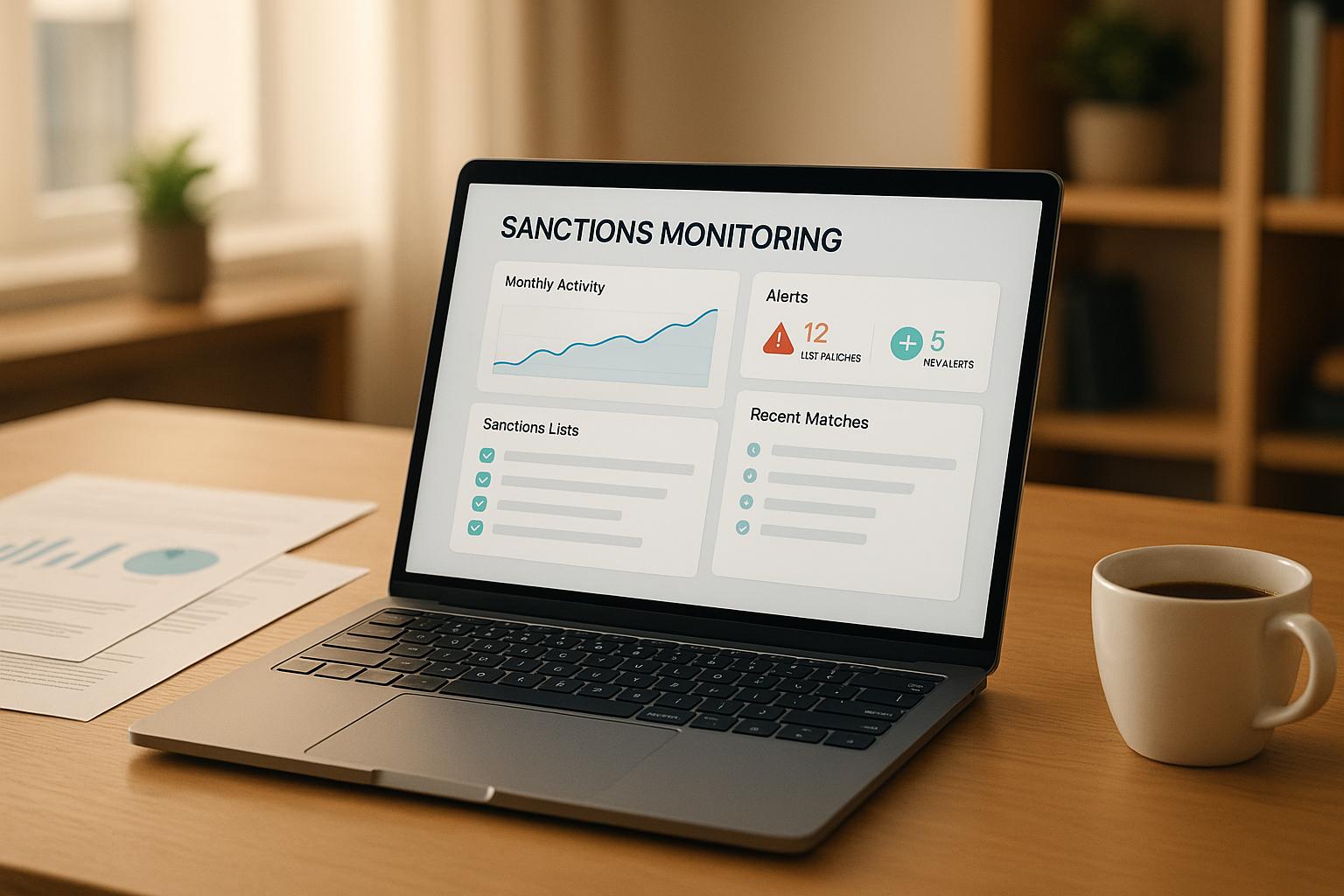
Top 7 Tools for Monitoring Sanctions Lists
Monitoring sanctions lists is critical for businesses to avoid penalties and ensure compliance with global regulations. Manually tracking updates is inefficient, so automated tools can help by providing real-time updates, advanced matching, and seamless integration into workflows. Here's a quick overview of the top tools:
- KYC Hub: Offers real-time updates, advanced algorithms, and customizable data subscriptions.
- ComplyAdvantage: AI-powered platform with reduced false positives and robust integration options.
- Dow Jones Risk & Compliance: High-frequency data feeds and tools for large-scale operations.
- Sanction Scanner: Quick screening, extensive global database, and customizable risk scoring.
- sanctions.io: Developer-friendly API with frequent updates and global coverage.
- AML Watcher: Multilingual screening, real-time updates, and bulk processing.
- Alessa: Real-time transaction screening with extensive global data.
These tools vary in features, pricing, and target users, ranging from startups to large enterprises. Choosing the right one depends on your business size, compliance needs, and budget. Below is a comparison to help guide your decision.
Discover the BITE Compliance Platform | Trade Compliance, Commodity and Sanctions Screening
Quick Comparison
| Tool | Key Features | Supported Lists | Integration Options | Pricing Model | Best For |
|---|---|---|---|---|---|
| KYC Hub | Real-time updates, advanced algorithms | OFAC, UN, EU, and custom lists | API, webhooks | Subscription-based | Medium-sized businesses |
| ComplyAdvantage | AI-powered, reduced false positives | Global sanctions, PEP data | RESTful API | Volume-based pricing | Financial institutions |
| Dow Jones | High-frequency updates, risk intelligence | Prominent global watchlists | API, file transfers | Enterprise pricing | Large enterprises |
| Sanction Scanner | Quick screening, risk scoring | Global sanctions, PEP databases | REST API, webhooks | Freemium/subscription plans | Small businesses, startups |
| sanctions.io | Simple API, developer-friendly | OFAC, UN, EU | RESTful API | Pay-per-use | Developers, fintech startups |
| AML Watcher | Multilingual screening, bulk processing | Global sanctions, PEPs, adverse media | API, manual uploads | Subscription-based tiers | Compliance-focused organizations |
| Alessa | Real-time transaction screening | Global sanctions, PEPs, custom lists | Real-time/on-demand | Enterprise pricing | Large financial institutions |
These tools help streamline compliance processes, reduce false positives, and maintain up-to-date sanctions monitoring. Pick the one that aligns with your operational needs and compliance goals.
What to Look for in Sanctions List Monitoring Tools
Selecting the right sanctions list monitoring tool is a big deal. A poor choice can leave your business vulnerable to fines, while the right tool makes compliance much easier. Here’s what to keep in mind when evaluating your options:
Real-time updates are essential for staying ahead. Sanctions lists, like those from OFAC, get updated several times a week. Your tool should automatically fetch these updates within minutes, not hours or days. Look for features like timestamped notifications that show when new entries are added or existing ones are changed.
Comprehensive database coverage is key for businesses with global operations. It’s not just about OFAC lists - you’ll want a tool that also tracks sanctions from the European Union, United Nations, UK Treasury, and other major jurisdictions. A good tool will also clearly indicate which specific list triggered a match during screening.
Advanced matching algorithms are a must for accuracy. Basic systems rely on exact name matching, which can miss variations in spelling, aliases, or transliterations. More advanced tools use fuzzy matching to account for these differences, handling partial matches and even scoring potential hits by confidence levels.
Automated screening capabilities ensure every transaction is checked seamlessly. Tools with API integrations can screen transactions in real-time without slowing down your operations. This kind of automation ensures compliance without creating bottlenecks.
Audit trails provide a detailed record of every screening action. A solid tool will log when screenings happen, which databases were checked, what results were found, and how matches were resolved. These records should be easy to export and searchable by criteria like date, entity name, or screening results.
False positive management features help reduce unnecessary manual work. Since sanctions screening often generates false positives, a good tool should learn from your team’s decisions and automatically clear entities previously verified. This saves time while ensuring real risks are addressed.
User access controls protect your system from unauthorized changes. Role-based permissions are ideal, separating responsibilities between screening operators and compliance managers. The tool should log all user actions and prevent unauthorized modifications to critical settings.
Pricing transparency is another factor to consider. Some providers charge per screening, while others offer monthly subscriptions based on transaction volume or user count. Enterprise solutions may require custom pricing. Don’t forget to account for implementation costs, training, and ongoing support when comparing options.
Integration flexibility determines how easily the tool fits into your existing systems. Modern tools often offer REST APIs, webhook notifications, and pre-built connectors for popular software. The tool should adapt to your workflows, not the other way around.
Customer support quality can make a big difference in time-sensitive situations. Look for providers with dedicated support teams who understand sanctions regulations, not just the technical side of things. Response time guarantees and clear escalation procedures are crucial for urgent issues.
1. KYC Hub
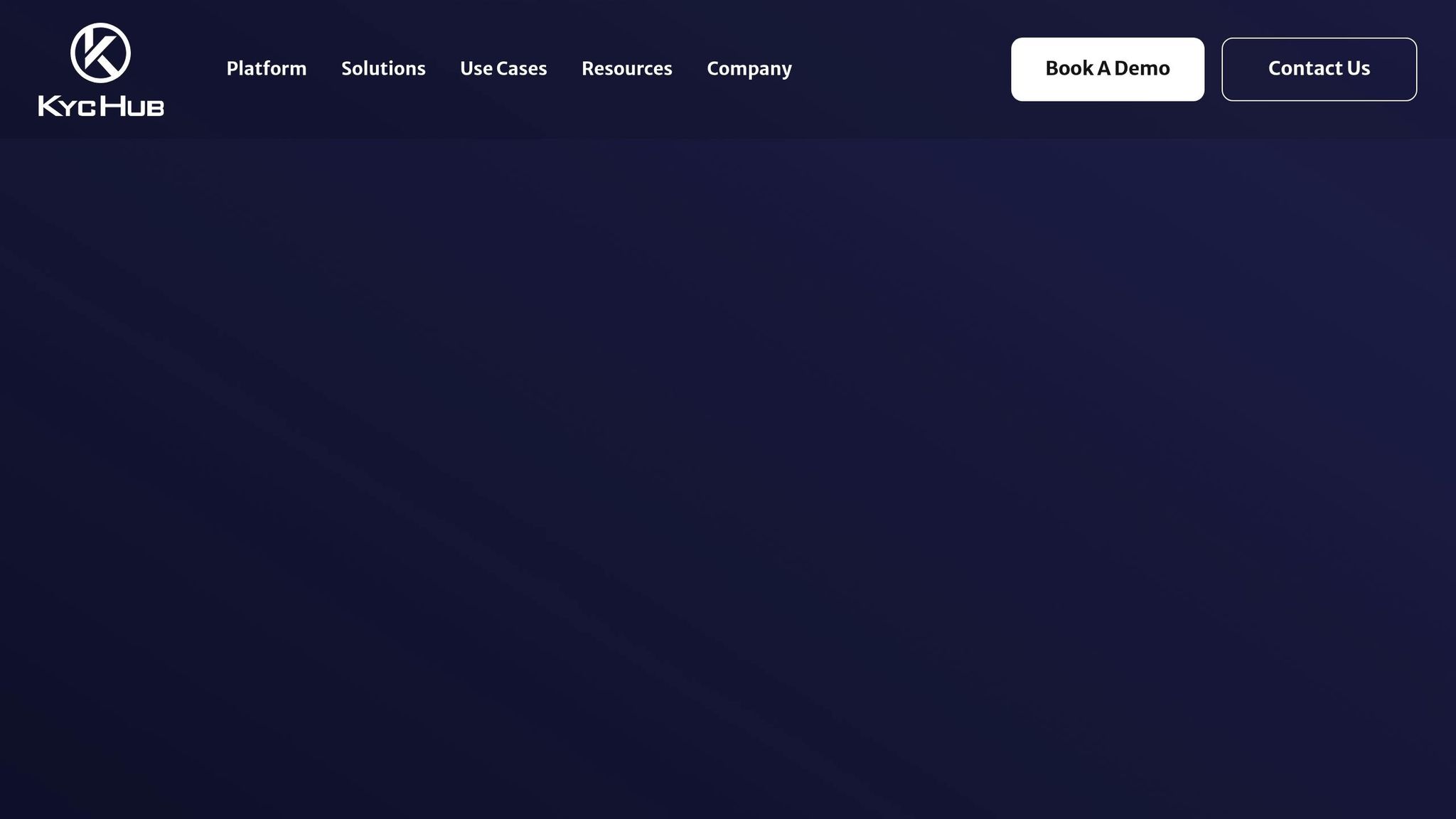
KYC Hub offers a powerful blend of Know Your Customer (KYC) verification and thorough sanctions monitoring, equipping businesses with effective tools to meet compliance requirements.
Real-time Updates and Comprehensive Sanctions Monitoring
To address critical compliance demands, KYC Hub monitors major global sanctions lists and provides real-time updates, helping businesses stay aligned with the most up-to-date information.
Smart Algorithms and Tailored Data Integration
By utilizing advanced algorithms, KYC Hub minimizes risks and reduces false positives. It also incorporates customizable data subscriptions, giving businesses access to the compliance data they need most.
2. ComplyAdvantage
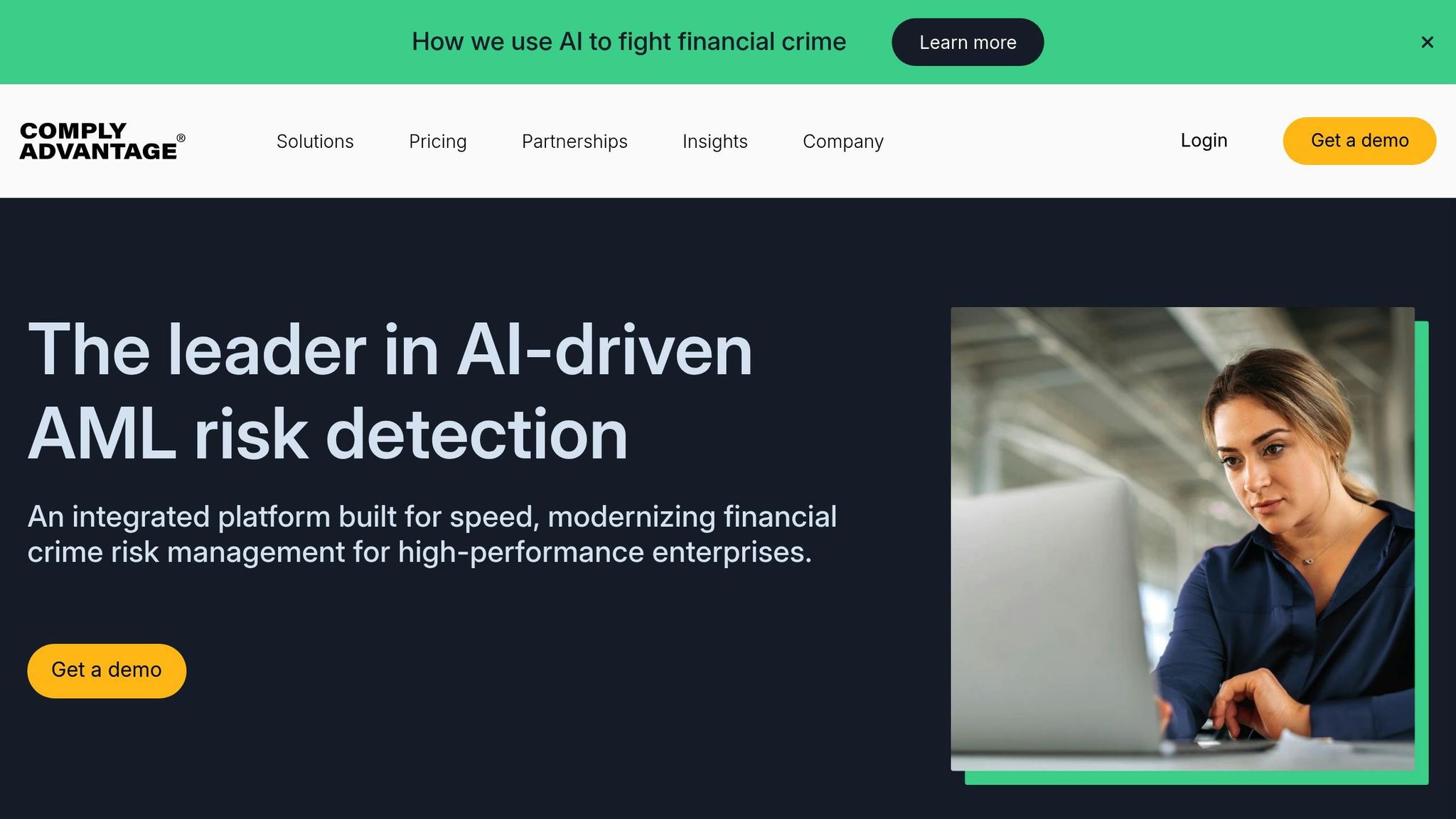
ComplyAdvantage provides an AI-powered tool designed to help organizations manage and monitor sanctions risks effectively. By combining machine learning with carefully curated data, the platform keeps track of global sanctions lists, making it a valuable asset for businesses of all sizes aiming to stay compliant.
Real-time Updates and Comprehensive Sanctions Monitoring
ComplyAdvantage keeps a constant eye on sanctions lists from various regulatory bodies, ensuring businesses have access to the most up-to-date information. This real-time monitoring enables companies to respond swiftly to changes in sanctions regimes, ensuring compliance across multiple jurisdictions. The platform's ability to integrate seamlessly with existing systems makes it a practical choice for organizations looking to enhance their compliance processes.
Automation and Easy Integration
The platform offers integration options through RESTful APIs, allowing businesses to embed its screening capabilities directly into tools like CRM systems or transaction monitoring workflows. Automation features simplify the screening process, saving time and resources while improving operational efficiency. This makes ComplyAdvantage a key component in building a fully automated compliance system.
Advanced Accuracy and Reduced False Positives
Using natural language processing and sophisticated matching techniques, ComplyAdvantage improves the accuracy of its screenings. By accounting for name variations and other nuances, the system helps compliance teams focus on genuinely high-risk cases, significantly reducing the number of false positives they need to review.
Detailed Audit Logs for Compliance Reviews
Every screening action is logged, creating a clear and accessible record for internal audits and regulatory reviews. These historical records provide valuable insights and context, making compliance assessments smoother and more transparent.
3. Dow Jones Risk & Compliance
Dow Jones Risk & Compliance goes beyond standard monitoring tools by offering specialized data feeds that keep users informed with precise and timely updates. This sanctions monitoring tool continuously tracks global sanctions lists, ensuring users stay aligned with the latest developments through real-time updates and expert insights.
Real-Time Monitoring
With its high-frequency data feeds, the platform provides users with the most current sanction information available. This ensures businesses can adapt quickly to shifting global compliance requirements.
Advanced Screening for High-Volume Needs
Designed to handle high-demand environments, the tool excels at real-time screening, making it an ideal choice for managing large volumes of relationships efficiently and effectively.
4. Sanction Scanner
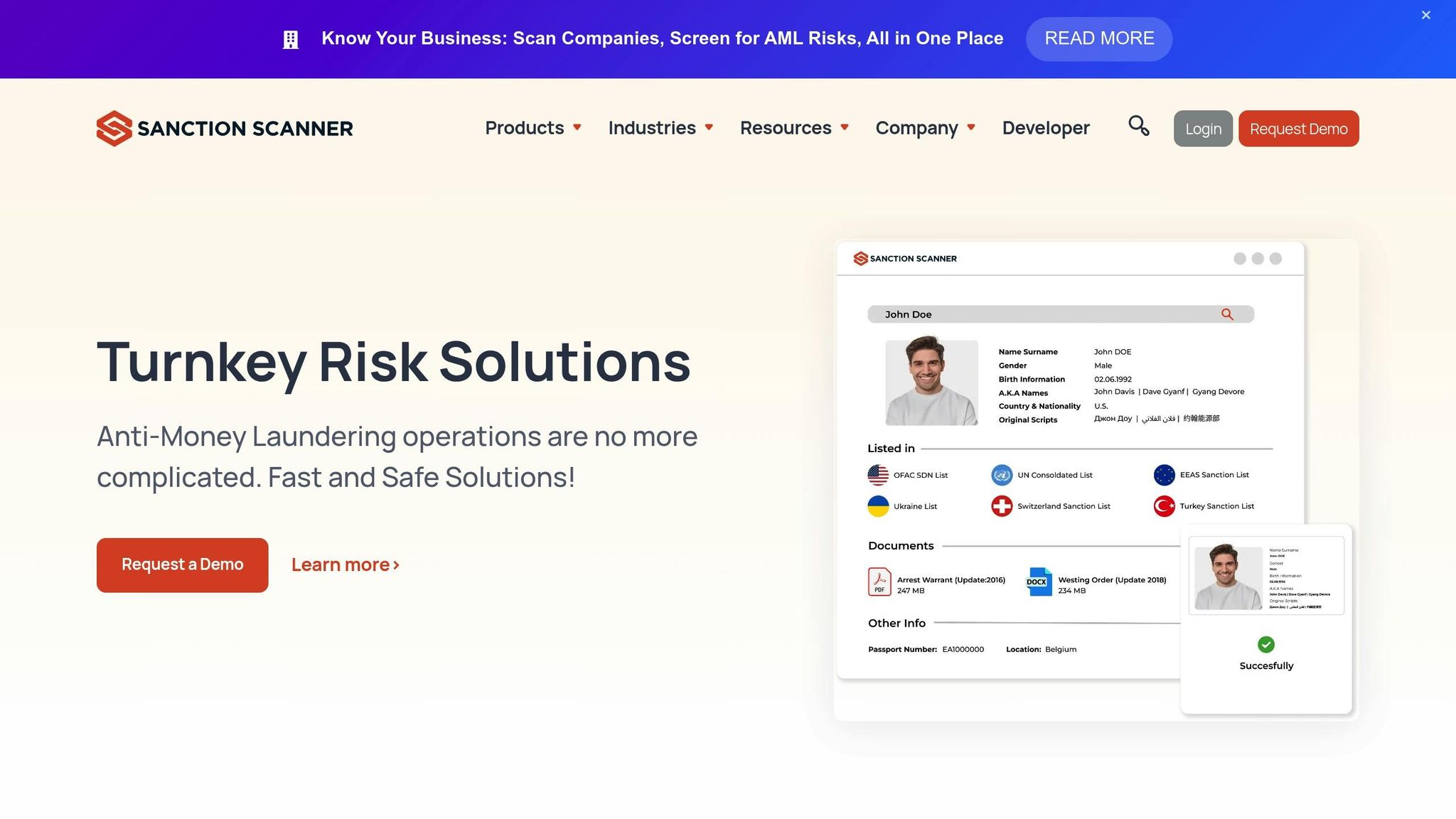
Sanction Scanner delivers fast and efficient screening, handling requests in just 150 milliseconds, while offering access to an extensive global sanctions database.
Real-Time Updates and Comprehensive Global Coverage
Sanction Scanner boasts a database that includes over 3,000 sanctions, PEP, and watchlists from more than 220 countries. With automated updates every 15 minutes, compliance teams can rely on having the latest information from major international organizations like the UN, US Treasury, UK HMT, and EU, as well as regional lists from countries such as Japan, Canada, and Australia. By using AI to gather and structure data from these diverse sources, the platform ensures accuracy and consistency. These frequent updates seamlessly integrate into your existing workflow, keeping your compliance processes up-to-date.
"Sanction Scanner provided us the most comprehensive database to screen our clients. It includes lists from all over the world and is always up-to-date." - Gulnihal Akartepe, Global Vice President at TPAY
Automation and Seamless Integration
The platform is designed to fit effortlessly into your current systems. Its API integration allows compliance teams to embed screening processes directly into their workflows. Automated alerts notify users of potential matches, enabling quick verification of customers, vendors, or transactions during onboarding or transaction reviews. This not only reduces manual effort but also helps mitigate risks efficiently.
"What I like best about Sanction Scanner is its real-time screening capability and automated alerts. It helps us detect potential matches instantly and take immediate action, which is critical for our AML compliance." - Tolgahan Kapanci, Head of Compliance at PeP
Precision and Advanced Filtering to Cut Down False Positives
One of the standout features of Sanction Scanner is its ability to minimize false positives through advanced filtering techniques. Using fuzzy logic and multilingual support, the platform can identify name variations, phonetic matches, and aliases. Additional tools like match risk scoring and alert prioritization help compliance teams focus on genuine risks. Customizable scoring thresholds and region-specific workflows further fine-tune the screening process, making it more efficient.
"Sanction Scanner's software is easy to use, and we enjoy working with it. Since implementing its solution, we have significantly reduced false positives. The time and effort we previously spent on false positive alarms can now be directed towards other aspects of the business, which contributes to its growth." - Guy Shaked, Legal Counsel at ironSource
sbb-itb-148ee33
5. sanctions.io
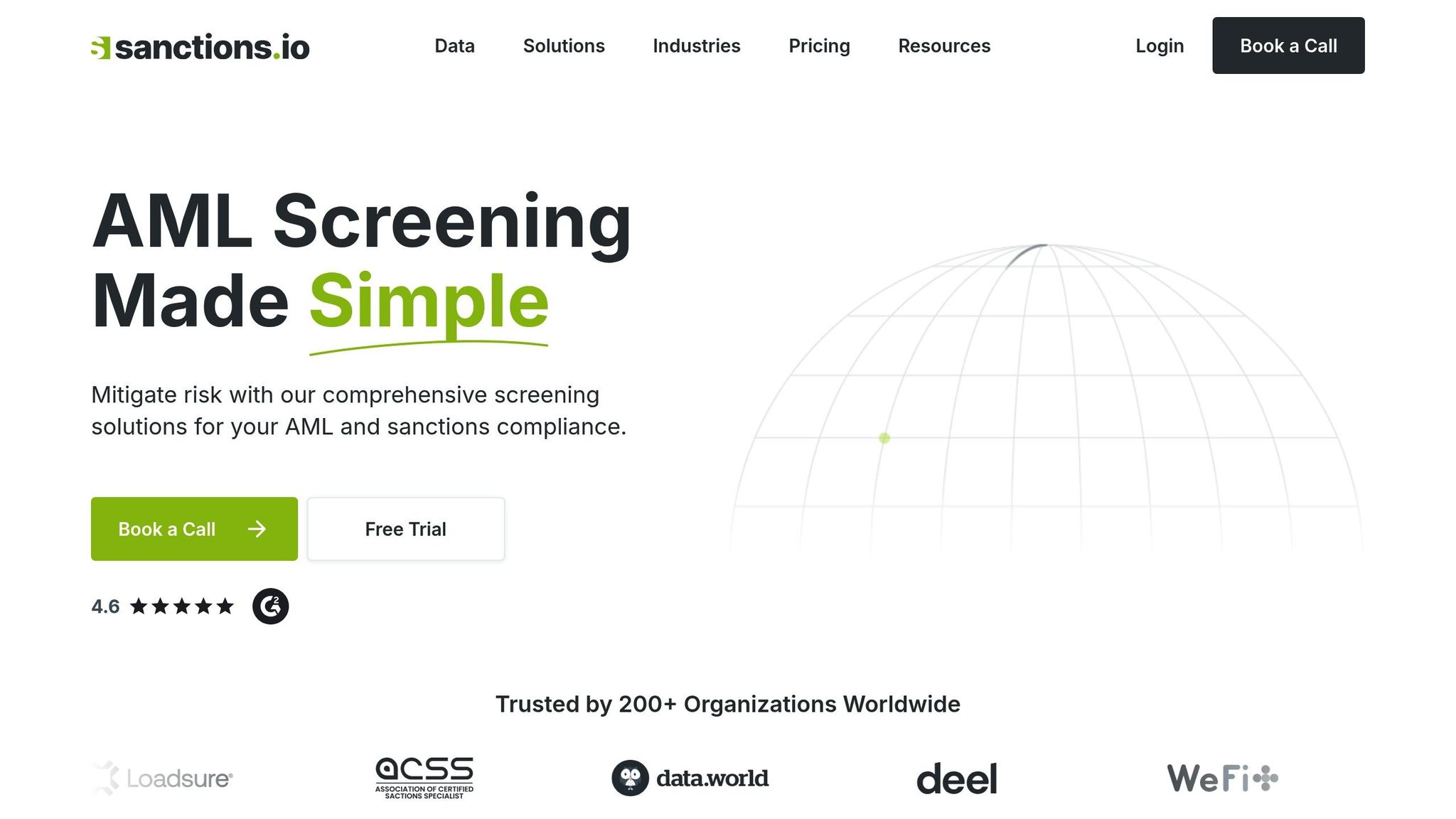
sanctions.io provides standardized sanctions data with dependable updates and extensive global reach.
Real-Time Updates and Comprehensive Sanctions List Coverage
Staying on top of sanctions data requires reliable updates and well-organized information, which is exactly what sanctions.io delivers. The platform refreshes its sanctions database every 60 minutes, ensuring compliance teams always have access to the latest updates. This frequent update cycle supports the need for timely and accurate data, a key feature for any effective compliance tool.
With coverage spanning over 75 sanctions and watchlists from more than 30 jurisdictions worldwide, sanctions.io includes data from major organizations like the United Nations and OFAC. Each update is paired with auditable timestamps, providing a transparent compliance trail that users can trust.
The platform also processes raw data by cleansing, standardizing, and enriching it, which helps ease the workload for compliance teams and streamlines the monitoring process.
6. AML Watcher
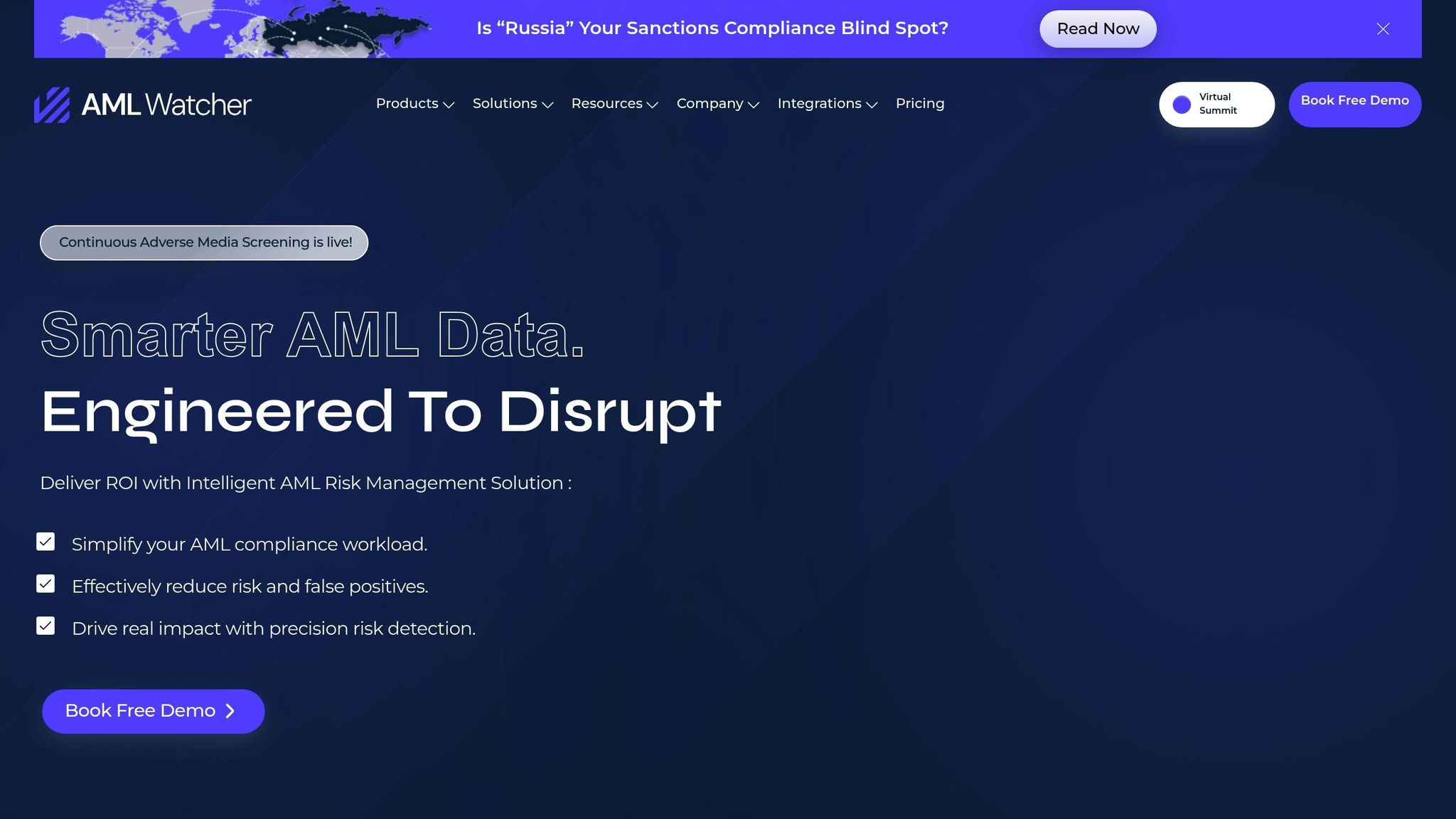
AML Watcher sets itself apart with its fast data refresh cycles and broad coverage of global sanctions, offering instant updates and multilingual screening tailored for international operations.
Real-Time Updates and Global Sanctions Coverage
AML Watcher updates its databases every 15 minutes using an event-driven system that detects changes within seconds. It provides access to over 215 sanction regimes and supports screening in more than 80 languages. As the platform notes, "any new or modified data is quickly shown in the AML compliance checks".
What makes it even more effective is its inclusion of lesser-known regional sanctions lists from both domestic and international sources. This is especially useful for businesses operating across diverse global markets. With this real-time data, AML Watcher integrates smoothly into compliance workflows, ensuring you’re always up to date.
Automation and Integration Features
The platform's Compliance API is designed for quick integration, supporting a variety of tech stacks. It also offers an on-premises solution, giving organizations full control over their data. Bulk screening capabilities, such as processing up to 500 entities via CSV uploads, significantly reduce manual effort. Additionally, biometric auto-population minimizes human errors, simplifying compliance processes.
For companies with heightened security needs, the on-premises option allows deployment directly within their infrastructure while still benefiting from AML Watcher's powerful sanctions monitoring.
Precision and Advanced Filtering to Minimize False Positives
AML Watcher employs advanced fuzzy matching and customizable risk scoring to cut down on false positives, ensuring your team can concentrate on actual threats. The platform also supports personalized risk models and adjustable thresholds, allowing organizations to adapt screening processes to their unique risk profiles and operational needs.
7. Alessa
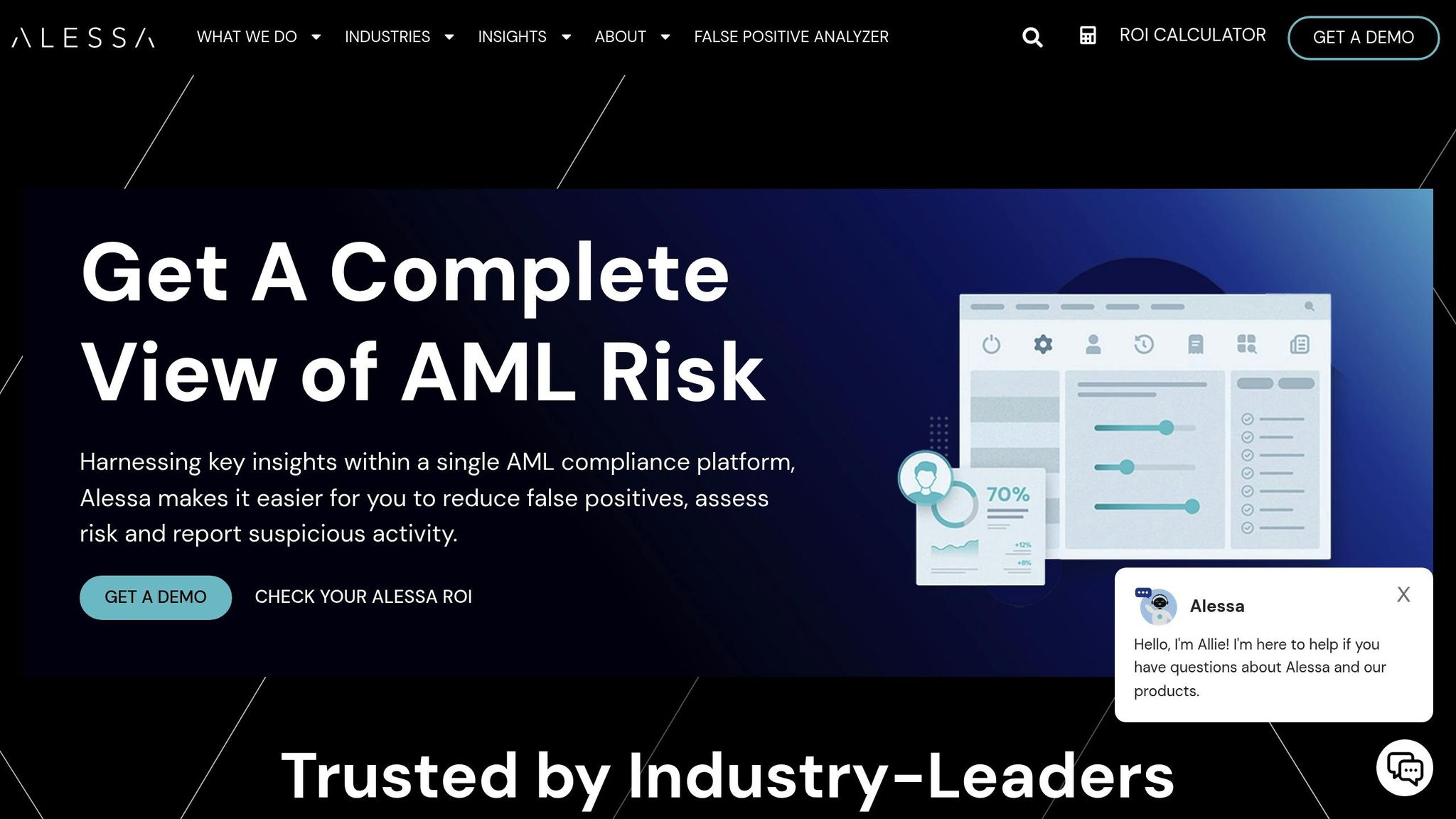
Alessa combines real-time transaction screening with extensive global data coverage, delivering a powerful solution for sanctions monitoring.
Real-Time Updates and Comprehensive Sanctions List Coverage
Alessa ensures your compliance checks stay up-to-date by refreshing sanctions records within 24 business hours of any changes to global watchlists. Beyond standard monitoring, it maintains a database of over 2 million Politically Exposed Persons (PEPs), with profiles and scores updated nightly through its global provider network.
The platform covers a wide range of critical areas, including Global Sanctions, Sanctions Control and Ownership, PEPs, Watchlists, and Adverse Media. It integrates data from third-party providers like Rzolut, World-Check, and Dow Jones, alongside current OFAC lists, law enforcement databases, and internal high-risk lists provided by clients. This combination delivers a detailed view of potential risks.
What truly sets Alessa apart is its real-time transaction screening capability. This feature helps organizations identify potential sanctions exposure immediately, rather than relying on periodic reviews. By meeting automated screening and audit trail requirements, Alessa supports proactive and effective compliance monitoring.
Automation and Integration Capabilities
Alessa provides flexible screening options, including real-time, periodic, and on-demand screenings for both entities and transactions. This adaptability allows businesses to customize their compliance strategies based on operational needs and risk levels. Automated workflows streamline the compliance process, enabling organizations to set screening parameters that align with their risk profiles while ensuring consistent monitoring across all departments.
Tool Comparison Chart
The chart below highlights key differences among seven sanctions list monitoring tools, helping you identify the best option for maintaining compliance. It outlines features, data coverage, integration options, pricing, and ideal use cases.
| Tool | Key Features | Supported Lists | Integration Options | Pricing Model | Best For |
|---|---|---|---|---|---|
| KYC Hub | Real-time screening, automated workflows, and case management | Major lists like OFAC, UN, EU, and custom lists | API, webhooks, and other integrations | Subscription-based | Medium-sized businesses with complex compliance needs |
| ComplyAdvantage | AI-powered screening, reduced false positives, adverse media monitoring | Extensive global sanctions lists and PEP data | RESTful API with batch processing | Volume-based pricing | Financial institutions managing high transaction volumes |
| Dow Jones Risk & Compliance | Risk intelligence database, enhanced due diligence, and risk scoring | Prominent global watchlists, including OFAC | API integration and file-based transfers | Enterprise pricing – contact for details | Large enterprises needing premium risk data |
| Sanction Scanner | Bulk screening, real-time API, and customizable risk scoring | Global sanctions lists and PEP databases | REST API and webhook notifications | Freemium model with subscription plans | Small to medium businesses and startups |
| sanctions.io | Simple API integration, fast response times, and developer-friendly design | Major sanctions lists like OFAC, UN, and EU | RESTful API with JSON responses | Pay-per-use pricing | Developers and fintech startups |
| AML Watcher | Automated monitoring, compliance reporting, and audit trails | Global sanctions lists, PEPs, and adverse media | API integration and manual uploads | Subscription-based with tiered plans | Organizations focused on compliance monitoring |
| Alessa | Real-time transaction screening and flexible monitoring options | Major sanctions lists and custom list options | Real-time and on-demand screening | Enterprise pricing – contact for details | Large financial institutions needing timely insights |
This comparison underscores the importance of aligning your choice with your organization's specific needs. For smaller businesses or startups, Sanction Scanner offers a freemium model that combines affordability with essential features. On the other hand, platforms like ComplyAdvantage, Dow Jones Risk & Compliance, and Alessa cater to larger enterprises requiring advanced, real-time capabilities to handle complex compliance challenges.
While smaller organizations may prioritize straightforward pricing and ease of use, larger entities often lean toward feature-rich solutions with robust integration options. Evaluating your operational requirements will help you choose the tool that best fits your compliance strategy.
Conclusion
Selecting the right sanctions monitoring tool comes down to your company’s size, compliance priorities, and budget. Here’s a quick breakdown to help guide your decision:
- Startups: Sanction Scanner offers a freemium model, making it a cost-effective choice for smaller teams.
- Developers and fintech companies: sanctions.io stands out with its easy-to-use API integration.
- Medium-sized businesses: KYC Hub provides a solid balance of automation and functionality.
- High-volume operations: ComplyAdvantage delivers powerful AI-driven screening for handling large datasets.
- Large enterprises: Dow Jones Risk & Compliance and Alessa cater to the complex needs of bigger organizations.
- Detailed reporting needs: AML Watcher is ideal for those requiring thorough reporting and audit trails.
As highlighted earlier, real-time updates and smooth system integration are essential for effective sanctions monitoring. When evaluating tools, focus on those with transparent pricing that matches your usage and operational demands. Decide whether you need real-time screening or if batch processing will meet your compliance requirements.
Keep in mind that compliance regulations change frequently. Opt for a platform that stays current with sanctions list updates and regulatory shifts. Investing in the right sanctions monitoring tool not only helps you meet compliance standards but also protects your organization from potential fines and reputational risks.
FAQs
What should I look for in a sanctions list monitoring tool for my business?
When selecting a sanctions list monitoring tool, focus on tools that offer broad coverage and real-time updates. This ensures your business remains aligned with the latest regulatory changes. A tool with automated screening capabilities is also essential, as it can handle frequent updates efficiently and cut down on manual work.
Key features to consider include risk-based controls and a strong due diligence process - both of which help reduce false positives and enhance accuracy. It's also important to choose a tool that can adapt to shifting regulatory landscapes and provides dependable customer support to help navigate any compliance hurdles your business might encounter.
How do advanced algorithms in sanctions monitoring tools help reduce false positives and improve compliance efforts?
Advanced sanctions monitoring tools now leverage AI-powered matching techniques and contextual analysis to cut down on false positives. By processing data in a smarter way, these tools can distinguish between actual matches and irrelevant alerts, making screening against sanctions lists much more accurate.
This level of accuracy helps businesses direct their compliance efforts toward genuine risks, streamlining operations and cutting back on unnecessary manual reviews. The result? Organizations can maintain compliance more efficiently, save time, and avoid unnecessary disruptions to their workflows.
Why is it important for sanctions list monitoring tools to have real-time updates, and how do they deliver this feature?
Real-Time Updates in Sanctions List Monitoring
Keeping up with real-time updates is essential when it comes to monitoring sanctions lists. Why? Because it allows businesses to promptly spot changes to sanctioned entities, helping them avoid unauthorized transactions, hefty regulatory fines, and potential disruptions to their operations.
Many tools designed for this purpose continuously monitor sanctions databases and refresh their data automatically, often in real-time or at short intervals - sometimes as frequently as every 15 minutes. This ensures companies have the latest information at their fingertips, enabling them to make smarter decisions and stay compliant with regulations.
Related Articles
Calculate Your Import Costs
Use our free tariff calculator to estimate duties and total landed costs for your imports
Try Tariff Calculator